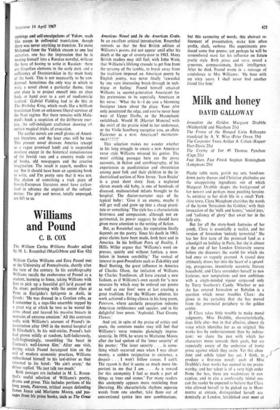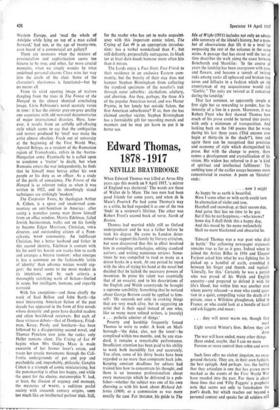Milk and honey
DAVID GALLOWAY
Jerusalem the Golden Margaret Drabble (Weidenfeld and Nicolson 21s) The Forest of the Hanged Liviu Rebreanu translated by A. V. Wise (Peter Owen 35s) The Carpenter Years Arthur A. Cohen (Rupert Hart-Davis 25s) The Crying of Lot 49 Thomas Pynchon (Cape 21s) Fast Start, Fast Finish Stephen Birmingham (Longmans 25s) Plastic table mats, garish tea sets, hand-me- down party dresses and Christian platitudes are the unappetising ingredients out of which Margaret Drabble shapes the background of her newest and perhaps most puzzling heroine. As antidote to her drab life in a small York- shire town, Clara Maugham cherishes the words of the hymn 'Jerusalem the Golden,' with their invocation of the 'milk and honey.' social joys,' and 'radiancy of glory' that await her in the holy city.
But for all the story-book fantasies of her youth, Clara is essentially a realist, and her version of Jerusalem 'entirely terrestrial.' She has her first taste of the promised land as a schoolgirl on holiday in Paris, but she is almost at the end of her London University course before she discovers the world for which she had once so vaguely yearned. A casual date ultimately draws her into the heart of a sprawl. ing, prosperous, inventively eccentric literary household, and Clara surrenders herself to new horizons, new temptations and new ambitions with a single-minded vigour surpassed only by Terry Southern's Candy. Whether or not she has entered Jerusalem or Babylon is a question which never troubles Clara: she glows in the certainty that she has moved from the provincial periphery to the golden centre.
If Clara takes little trouble to make moral judgments, Miss Drabble, characteristically, does little else—but in that allusive, almost sly voice which identifies her as an original. She works less by understatement than by indirec- tion: we share the zest with which her characters move towards their goals, but are repeatedly aware of the undertow of ironic prose against which they swim. Yet this abun dant and subtle talent has yet, 1 think, to,- produce a first-rate novel: each of Miss Drabble's four works has seemed to me praise.
worthy, and her talent is of a very high order None the less, there are weaknesses in con ception, and to cite a confessedly trivial one can the reader be expected to believe that Clara who allowed herself to be picked up in Mont martre at sixteen, distinguished herself aca demically at London, hitchhiked over most ol Western Europe, and 'read the whole of Adolphe while lying on top of a man called Bernard,' had not, at the age of twenty-tWo, even heard of a commercial art gallery?
There are moments when the mixture of provincialism and sophistication seems too bizarre to be true, and other, far more crucial moments, when we simply wonder by what undefined personal charms Clara wins her way into the circle of the elect. Some of the character's elusiveness is functional—but by no means all.
From its vivid opening image of traitors dangling from the trees in The Forest of the Hanged to the almost identical concluding image, Liviu Rebreanu's novel scarcely varies in tone: it has the sinister grey-on-grey quality one associates with old newsreel documentaries of major international disasters. Here, how- ever, it results from an artfully self-effacing style which seems to say that the ambiguities and terrors produced by 'total' war make the artist almost obsolete. Fresh out of university at the beginning of the First World War, Apostol Bologa, as a resident of the Rumanian region of Transylvania, enlists in the Austro- Hungarian army. Eventually he is called upon to condemn a 'traitor' to death, but when Rumania enters the war independently, he finds that he himself must betray either his own people or his duty as an officer. As a study of the perils of conscience, The Forest of the Hanged is as relevant today as when it was written in 1922, and its absorbingly visual techniques are strikingly 'modern.'
The Carpenter Years, by theologian Arthur A. Cohen, is a spare and unadorned com- mentary on anti-Semitism in America : after seeing a nameless young man throw himself from an office window, Morris Edelman, failed Jewish businessman, walks out on his family to become Edgar Morrison, Christian, YMCA director, and outstanding citizen of a Penn- sylvania WASP community. An indifferent Christian, but a better husband and father in this second identity, Edelman is content with his lot until his Jewish son tracks him to earth and arranges a bizarre reunion: what emerges is less a comment on the fashionable 'crisis of identity' than advance notices would sug- gest: the novel seems to me more modest in its intentions, and by such criteria a thoroughly satisfying work of fiction—limited in scope, but intelligent, humane, and expertly narrated.
With few exceptions—and those chiefly the work of Saul Bellow and John Barth—the most interesting American fiction of the past decade has appeared in the form of first novels whose dexterity and gusto have dazzled readers and often bewildered reviewers. But each of these virtuoso debuts—that of Donleavy, Fried- man, Kesey, Purdy and Southern—has been followed by a disappointing second novel, and Thomas Pynchon now joins the ranks; only Heller remains silent. The Crying of Lot 49 begins when Mrs Oedipa Maas is made executrix of her former lover's estate, and traces her erratic movements through the Cali- frunia undergrounds of pot and pop and psychedelic and, improbably, philatelic. Genghis Cohen is a triumph of comic miniaturising, but the punsmanship is often less happy, and while the quest for the elusive, metamorphic V. had, at least, the illusion of urgency and moment, the mysteries of WASTE, a seditious postal society with sixteenth century origins, seem too much like an intellectual parlour trick. Still, for the reader who has yet to make acquaint- ance with this important comic talent, The Crying of Lot 49 is an appropriate introduc- tion: less a verbal wonderland than V., but still defiantly, purposefully outrageous, its black (or at least dark-hued) humour more often hits than it misses.
The Lords enjoy a Fast Start, Fast Finish to their residence in an exclusive Eastern com- munity, but the brevity of their stay does not hamper Stephen Birmingham from collecting the standard specimens of the novelist's trek through outer suburbia : alcoholism, adultery, and abortion. Are they, perhaps, the three A's of the popular American novel, and was Hester Prynne, in her lonely hut outside Salem, the first American suburbanite? If so, then she has claimed another victim; Stephen Birmingham has a formidable gift for recording morals and manners and he may yet learn to put it to better use.































 Previous page
Previous page